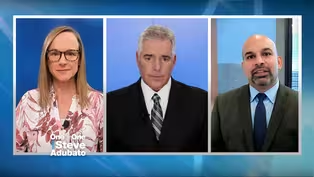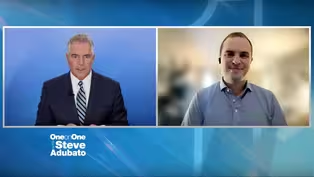One-on-One
The Heightening Issue of Food Insecurity
Clip: Season 2024 Episode 2702 | 7m 34sVideo has Closed Captions
The Heightening Issue of Food Insecurity
President and CEO of Fulfill Triada Stampas joins Steve Adubato to talk about the heightened issue of food insecurity and the pathways to success that her organization provides to those entering the restaurant industry.
Problems playing video? | Closed Captioning Feedback
Problems playing video? | Closed Captioning Feedback
One-on-One is a local public television program presented by NJ PBS
One-on-One
The Heightening Issue of Food Insecurity
Clip: Season 2024 Episode 2702 | 7m 34sVideo has Closed Captions
President and CEO of Fulfill Triada Stampas joins Steve Adubato to talk about the heightened issue of food insecurity and the pathways to success that her organization provides to those entering the restaurant industry.
Problems playing video? | Closed Captioning Feedback
How to Watch One-on-One
One-on-One is available to stream on pbs.org and the free PBS App, available on iPhone, Apple TV, Android TV, Android smartphones, Amazon Fire TV, Amazon Fire Tablet, Roku, Samsung Smart TV, and Vizio.
Providing Support for PBS.org
Learn Moreabout PBS online sponsorship(upbeat music) - We're now joined by Triada Stampas, who's President and CEO of an organization called Fulfill.
Good to see you, Triada.
- Thank you for having me.
- Great.
We're gonna put up the website.
Tell everyone what Fulfill is.
- Fulfill is the food bank that serves Monmouth and Ocean Counties at the Shore in New Jersey.
So, we serve a network of about 300 food pantry, soup kitchens, and other points of food distribution across those two counties.
- Triada, how bad is the food insecurity problem down in two counties, Ocean and Monmouth, that a lot of folks think, "Well, it's wealthy.
It's two of the wealthiest of the 21 counties in New Jersey.
What could the problem be?"
Please.
- You know, that's a great question, and I think you have identified, you know, one of the challenges that we face in this community.
Over 100,000 people a month are turning to a food pantry in just our two counties.
We are seeing need that is unprecedented, and we're past the pandemic.
We are past kind of the crisis point that we were all recently in.
And instead of seeing food insecurity drop, we are seeing the need for food assistance actually go up.
- Triada, what kind of families, what kind of people are we talking about who are now experiencing food insecurity that pre-pandemic may not have fallen into that category?
- Yeah, it really runs the gamut, Steve, and I think it's one of the challenges for us is that the common perception of who needs a food pantry or soup kitchen, I think is what people are most likely to see, which is someone who is unhoused or indigent.
And that's the mental image that comes to mind.
In reality, that is a small minority of people who are food insecure.
We are seeing working families, we are seeing senior citizens, anyone who has gotten pinched by the high cost of food and the inflation and cost of living that we've all experienced when their income hasn't been climbing at that same rate is turning to help that they may be never needed before.
- Triada, help us understand something.
In terms of government support, public support for the work you're doing, how much of your support is government taxpayer-funded support and what is on the private side?
Foundations, corporations, individuals, et cetera.
- So, food banks rely on a mix, and we do receive a significant amount of government support.
We turn to donations from individuals, from foundations, from corporations to supplement because we cannot subside on government assistance alone.
This really is an all-in effort for our entire society, really, to address food insecurity.
It is bigger than any one actor, bigger than any one entity to fix at this point.
And so we receive a significant share of assistance from both state, federal, and local government, but that alone doesn't carry us forward.
- And the corporate and foundation support comes from what kind of folks?
Who seems to care about the kinds of issues and the kind of people you're serving every day?
- You know, we're really lucky to have local businesses here at the Shore chip in, do fundraisers.
We have the creative class of musicians performing and donating a portion of their take to Fulfill, and the Jersey Shore does have a really well-established music scene.
We have major foundations like the Robert Wood Johnson Foundation, right, all of those big names as well as smaller local regional foundations that contribute to this cause.
So there are lots of folks who care, luckily.
The need is something more, however, right now than we are equipped to really address.
- Triada, help us on this.
There's an interesting program, the Fulfill's Culinary Skills Training Program.
What is that program and who benefits from it?
- So that is a job training program for folks who want to get their foot in the door in food service.
And so we provide a 13-week program for adults to learn.
I mean, I like to talk about it as everything from knife skills to life skills to, you know, help get your foot in the door in the food industry.
And so it is 12 weeks of instruction in the classroom and in the kitchen, one week in an externship with a local business, whether it's a restaurant, a catering facility, an institutional kitchen where you put those skills that you've been trained in into use, you know, in a real setting on the job.
And we think of it as a one-week job interview 'cause we work to identify externships at companies that are hiring.
We want our graduates to be able to seamlessly move from training into a real job that helps put money in their pocket and get them started in a new career.
- So, to Triada and her team, I just want to remind folks that part of our job is to feature not-for-profit organizations making a difference, which is why in many ways, I don't know, well over a decade ago we started calling the series "Making a Difference," not-for-profits "Making a Difference," and Fulfill clearly is one of those organizations in Monmouth and Ocean Counties where awful lot of folks go, "Well, really, seriously?
There are people who need help?"
And Triada has made the case in a very compelling and impactful way that that clearly is the situation.
Triada Stampas is the President and CEO of Fulfill.
Triada, thank you so much for joining us.
- Thank you for having me, Steve.
Really appreciate it, especially this time of the year.
- Yeah, our pleasure.
We're taping this right before the holiday season.
It'll be seen in 2024.
Thank you, Triada.
Stay with us.
We'll be right back.
- [Narrator] One-On-One with Steve Adubato is a production of the Caucus Educational Corporation.
Celebrating 30 years in public broadcasting.
Funding has been provided by Horizon Blue Cross Blue Shield of New Jersey.
The North Ward Center.
Hackensack Meridian Health.
NJM Insurance Group.
PSEG Foundation.
Newark Board of Education.
New Jersey Sharing Network.
NJ Best, New Jersey’s five-two-nine college savings plan.
And by The Russell Berrie Foundation.
Promotional support provided by New Jersey Globe.
And by NJBIZ.
The North Ward Center continues to expand their services and outreach in Newark, from the childhood years to the golden years, Offering programs like preschool, youth leadership development, Casa Israel Adult Medical Day program our Family Success center, as well as a gymnasium.
And most recently Hope House, a permanent home for adults with autism, supporting and nurturing our autism community with Hope House 2 coming soon.
The North Ward Center.
We’re here when you need us.
Choose NJ CEO Discusses Recent Trip to East Asia
Video has Closed Captions
Clip: S2024 Ep2702 | 10m 19s | Choose NJ CEO Discusses Recent Trip to East Asia (10m 19s)
Using Golf as a Vehicle for Growth in Underserved Areas
Video has Closed Captions
Clip: S2024 Ep2702 | 9m 43s | Using Golf as a Vehicle for Growth in Underserved Areas (9m 43s)
Providing Support for PBS.org
Learn Moreabout PBS online sponsorship
- News and Public Affairs

Top journalists deliver compelling original analysis of the hour's headlines.

- News and Public Affairs

FRONTLINE is investigative journalism that questions, explains and changes our world.












Support for PBS provided by:
One-on-One is a local public television program presented by NJ PBS

